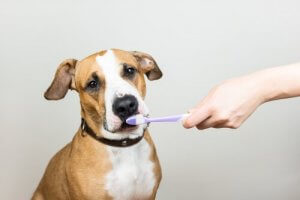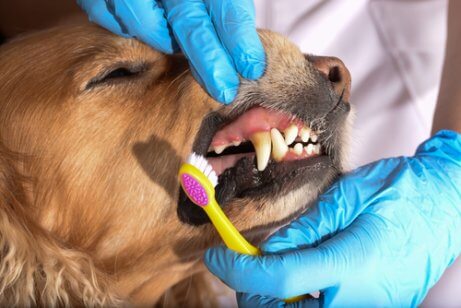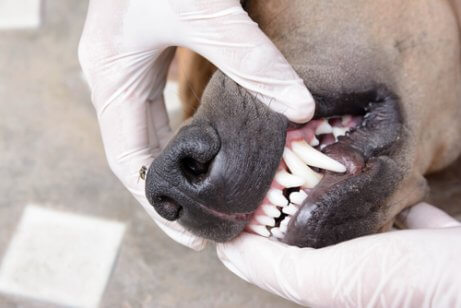The Importance of Your Pet's Dental Health

Your pet’s dental health is very important in order for your pets to have a high quality of life. Approximately 9 out of 10 pets suffer from periodontal disease before they are four years old.
Most dogs and cats suffer minor dental diseases, which fortunately don’t usually turn into more serious problems. A dental disease, however, can progressively turn into much more serious conditions.
Periodontal diseases are conditions that evolve progressively and affect the gums of the teeth. In its worst state, periodontitis in pets can lead to tooth loss.
But periodontal diseases aren’t the only conditions that can develop from problems with your pet’s dental health. Bacteria in the mouth can lead to dogs developing sores or even abscesses if their gums are injured.
It’s important that you get your pet’s dental health evaluated by a professional at least once a year. A veterinarian will be able to properly clean your pet’s mouth to assess their dental health.
Your pet may suffer from various conditions, such as gingivitis, caused by tartar and excess bacteria. However, these are easily reversible with the intervention of a professional. Although periodontal diseases are not reversible, you can alleviate most symptoms with simple care.

The importance of your pet’s dental health
A dental cleaning consists of removing tartar from your pet’s teeth. Tartar is responsible for promoting bacteria that causes gingivitis.
In addition to cleaning off any tartar, a veterinarian will assess the health of your pet’s tongue, gum, lips, and upper throat. This way, a huge number of diseases can be avoided. Remember, prevention is the best medicine.
Caring for your pet’s dental health will require your pet to be under general anesthesia. Anesthesia during dental cleaning will prevent your pet from suffering any pain. It also allows a veterinarian to evaluate your pet’s dental health in greater detail. We recommend, however, that you go to a trusted vet to perform this procedure.
A dental cleaning includes the following:
- Removal of plaque on the teeth
- Removal of the plaque just below the gums
- Assessing the oral cavity for possible dental diseases
- Polishing the teeth to allow for a better bite and smooth tooth surfaces
- Application of fluoride of sealants where necessary
- X-rays, if necessary, to evaluate the dental health of your pet
Reasons for concern
If you notice an unpleasant odor from your pet’s mouth, it’s likely that she needs a dental cleaning. We recommend that you evaluate your pet’s mouth regularly.
If you see green or brown spots on your pet’s teeth, you should take your pet to the vet to determine the seriousness of the problem. Also, if you notice redness or sores on their gums, it’s also time for a visit to the vet.

You should also be attentive to your pet’s eating patterns. If your pet is having problems chewing or whines while playing, they may be suffering pain inside their mouths. In this case, a dental health check is necessary.
How to maintain your pet’s dental health
After getting a professional dental cleaning, you can take a series of very simple steps to help maintain your pet’s dental health. These steps will help keep your pet’s oral health in perfect condition.
One thing you can do is to brush your pet’s teeth once a week. There is also a variety of toothpaste for dogs and cats that can help strengthen tooth enamel and eliminate bacteria.
A lack of proper oral hygiene can lead to serious conditions, such as heart problems. This can occur when oral bacteria gets into the bloodstream.
Your pet’s dental health is an important part of their general health and long-term happiness. Remember, that just like with small children, your pet depends on you to care for him.
Your pet’s dental health is very important in order for your pets to have a high quality of life. Approximately 9 out of 10 pets suffer from periodontal disease before they are four years old.
Most dogs and cats suffer minor dental diseases, which fortunately don’t usually turn into more serious problems. A dental disease, however, can progressively turn into much more serious conditions.
Periodontal diseases are conditions that evolve progressively and affect the gums of the teeth. In its worst state, periodontitis in pets can lead to tooth loss.
But periodontal diseases aren’t the only conditions that can develop from problems with your pet’s dental health. Bacteria in the mouth can lead to dogs developing sores or even abscesses if their gums are injured.
It’s important that you get your pet’s dental health evaluated by a professional at least once a year. A veterinarian will be able to properly clean your pet’s mouth to assess their dental health.
Your pet may suffer from various conditions, such as gingivitis, caused by tartar and excess bacteria. However, these are easily reversible with the intervention of a professional. Although periodontal diseases are not reversible, you can alleviate most symptoms with simple care.

The importance of your pet’s dental health
A dental cleaning consists of removing tartar from your pet’s teeth. Tartar is responsible for promoting bacteria that causes gingivitis.
In addition to cleaning off any tartar, a veterinarian will assess the health of your pet’s tongue, gum, lips, and upper throat. This way, a huge number of diseases can be avoided. Remember, prevention is the best medicine.
Caring for your pet’s dental health will require your pet to be under general anesthesia. Anesthesia during dental cleaning will prevent your pet from suffering any pain. It also allows a veterinarian to evaluate your pet’s dental health in greater detail. We recommend, however, that you go to a trusted vet to perform this procedure.
A dental cleaning includes the following:
- Removal of plaque on the teeth
- Removal of the plaque just below the gums
- Assessing the oral cavity for possible dental diseases
- Polishing the teeth to allow for a better bite and smooth tooth surfaces
- Application of fluoride of sealants where necessary
- X-rays, if necessary, to evaluate the dental health of your pet
Reasons for concern
If you notice an unpleasant odor from your pet’s mouth, it’s likely that she needs a dental cleaning. We recommend that you evaluate your pet’s mouth regularly.
If you see green or brown spots on your pet’s teeth, you should take your pet to the vet to determine the seriousness of the problem. Also, if you notice redness or sores on their gums, it’s also time for a visit to the vet.

You should also be attentive to your pet’s eating patterns. If your pet is having problems chewing or whines while playing, they may be suffering pain inside their mouths. In this case, a dental health check is necessary.
How to maintain your pet’s dental health
After getting a professional dental cleaning, you can take a series of very simple steps to help maintain your pet’s dental health. These steps will help keep your pet’s oral health in perfect condition.
One thing you can do is to brush your pet’s teeth once a week. There is also a variety of toothpaste for dogs and cats that can help strengthen tooth enamel and eliminate bacteria.
A lack of proper oral hygiene can lead to serious conditions, such as heart problems. This can occur when oral bacteria gets into the bloodstream.
Your pet’s dental health is an important part of their general health and long-term happiness. Remember, that just like with small children, your pet depends on you to care for him.
All cited sources were thoroughly reviewed by our team to ensure their quality, reliability, currency, and validity. The bibliography of this article was considered reliable and of academic or scientific accuracy.
- Hennet, P. (s/f) Nutrición y salud oral en el perro. Ediciones Royal Canin.
- Moreno, R.L. (2004) Utilización de plasma rico en plaquetas para regeneración periodontal en un perro. Revista Odontológica Mexicana, Volúmen 8, Número 3.
This text is provided for informational purposes only and does not replace consultation with a professional. If in doubt, consult your specialist.








